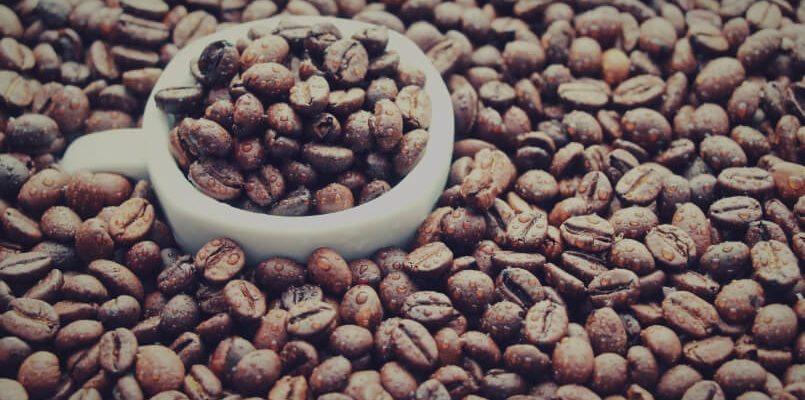The whole truth about the harm of coffee to human health

What effect does coffee have on the body? How real is the harm of coffee? How much coffee can you drink without harm to your health?
Coffee is one of the most popular drinks in the world. People don’t like to hear negative characteristics of it. But this article is not intended to please public opinion. In it we will tell the whole truth about coffee.
However, let’s be frank, for a particular person, coffee can have a number of benefits. But it may not be a healthy choice for everyone.
Content
The negative effect of coffee on the human body
“ Coffee is a very personal drink. It, like cognac, cannot be drunk in circles! “
Winston Churchill
So let’s take a look at the negative side effects of drinking coffee.
1. Caffeine raises blood pressure
Research shows that coffee can be beneficial with less than 400 mg of caffeine per day. Negative effects tend to appear when a person drinks more than this.
However, the amount of caffeine in coffee can vary greatly. For example, an Americano cup contains 75 to 300 mg of caffeine , depending on the size.
If you brew coffee at home, the caffeine content will vary depending on the type of coffee and the brewing method.
In addition, instant coffee usually contains less caffeine.
Keep in mind that everyone metabolizes caffeine differently, and it is “easy” for some to get too much. This is the reason why coffee should not be given to young children.
So, the harm of drinking coffee and caffeine is that it can dramatically increase blood pressure – both diastolic and systolic. This effect usually lasts for 3-6 hours (with a peak 1-2 hours after drinking coffee).

Interestingly, caffeine has no effect on acute increases in blood pressure in avid coffee drinkers. This is thought to be due to the fact that they develop a tolerance to the effects of caffeine, which increases blood pressure.
Can coffee cause hypertension?
If the effect of coffee on blood vessels can raise blood pressure, can it lead to hypertension?
The answer to this question seems to be no. A review of studies on this topic did not show a direct relationship between coffee consumption and hypertension.
Important: Coffee can raise blood pressure – at least in the short term.
2. Coffee causes insomnia
Another downside to drinking coffee is that it interferes with healthy sleep .
Of course, some people can drink coffee right before bed and sleep soundly. Once again, the reason for this is that all people metabolize coffee (and caffeine) differently : some faster, some slower.
Caffeine has a long half-life. On average, it is about 5-6 hours for healthy people, but it can be higher depending on liver health and a number of other factors.
Therefore, if you drink coffee in the evening, it can damage your circadian rhythms. Research confirms that high levels of caffeine intake are associated with a higher risk of insomnia.
In addition, drinking coffee within 6 hours of bedtime will have an impact not only on sleep duration, but also on quality.
Important: Drinking coffee late at night causes insomnia.
3. Abrupt withdrawal from caffeine leads to headaches
In fact, caffeine is a drug , and withdrawal from it leads to withdrawal symptoms.
First of all, it manifests itself as migraines, which disappear if a person starts to use caffeine again.
One interesting experiment looked at the blood flow of people in the early days of caffeine abstinence. Scientists have shown that stopping caffeine consumption decreases electrical activity in the brain and increases blood flow.
This explains the side effects such as headaches, fatigue and lethargy.
How long does this effect last?
Typically, withdrawal peaks after 1–2 days of caffeine abstinence and can last up to 1–2 weeks.
Important: coffee is a drug, and refusal from it provokes unpleasant symptoms.
4. Coffee aggravates acid reflux and heartburn symptoms
Acid reflux and gastroesophageal reflux disease (GERD) are extremely unpleasant diseases.
There are various theories about the reasons for their occurrence, but the fact is that certain foods and drinks make these diseases worse.
Unfortunately coffee is one of them. People often suffer from heartburn after drinking coffee.

Research shows that coffee can weaken the lower esophageal sphincter, the valve that separates the esophagus and stomach.
Important: Coffee can cause acid reflux and heartburn.
5. Caffeine causes anxiety and panic attacks
Coffee and caffeine have negative effects on people prone to anxiety and depression.
In one illustrative experiment, scientists studied the behavior of 98 people after drinking coffee.
72 participants initially suffered from panic disorder and social anxiety. 26 were mentally healthy.
After taking 480 mg of caffeine, 31 out of 72 patients with mental health problems experienced a panic attack. 26 healthy participants showed no symptoms.
A second test was performed a week later. All participants were given a placebo instead of coffee. No one showed any symptoms.
Obviously, caffeine can cause anxiety attacks and intense anxiety in those at risk.
Important: Some people may experience anxiety and fear when consuming large amounts of caffeine.
6. Coffee increases the risk of miscarriage during pregnancy
Many expectant mothers need to avoid coffee. During pregnancy, its harm is especially felt.
Over the past few years, there have been several large-scale studies on the effects of caffeine on pregnancy. Here are the main points:
- There is a direct link between excessive consumption of caffeine and miscarriage;
- Maximum dose for pregnant women: 2-3 cups of coffee a day (200-300 mg of caffeine);
- The risk of having an underdeveloped baby increases linearly with increasing caffeine intake.
Overall, the data shows that a small amount of caffeine (1 or 2 cups of coffee a day) is an “acceptable” risk.
However, since complications are dose-dependent, it may be best to skip coffee altogether during pregnancy.
Important: Caffeine consumption increases the risk of pregnancy complications.
7. Coffee can contribute to IBS and other digestive problems
Irritable bowel syndrome (IBS) is a global problem in modern people. Its prevalence among the population of developed countries is estimated to be 10-20%.
IBS patients often suffer from side effects after consuming many foods, including coffee.
What is the harm of coffee for the stomach and digestion?
People with IBS complain of bloating and heartburn after drinking coffee (especially on an empty stomach).
This is due to the fact that coffee increases the motor activity of the colon and also stimulates the secretion of stomach acid.
Important: Coffee can worsen IBS and other diseases of the gastrointestinal tract.
8. Some coffee drinks are high in sugar and fat.
While a cup of coffee can bring some relief, it will quickly disappear if the coffee is loaded with sugar.
Some coffee drinks in stores and cafes contain up to 60 grams ( 15 teaspoons ) of sugar.

In addition, certain types of coffee may contain excessive amounts of fat and calories.
While there is nothing wrong with adding a little cream (or butter, if you like) to coffee, eating liquid fats is not good for good health.
Important: For less harm, choose black coffee or lattes and avoid coffee drinks with a lot of sugar or fat.
9. Caffeine is a strong allergen
Finally, there are people who are physically intolerant of coffee.
Those who are allergic to coffee soon develop side effects and serious symptoms up to anaphylaxis.
Some people cannot metabolize caffeine and it has a much stronger effect on their bodies. Especially when consuming large quantities of coffee in a short period.
Some of the symptoms of coffee allergy are:
- Shiver;
- Heart palpitations;
- Dizziness;
- Shortness of breath or chest tightness.
Thoughts about the harm of coffee
The solution to all “coffee” problems lies in the reasonableness of its use.
No matter how much someone might like coffee, if it causes nausea and other side effects, isn’t that a reason to think?
In any case, even if there is no apparent reason to refuse coffee, you need to know that its effect on the human body is not always favorable.







